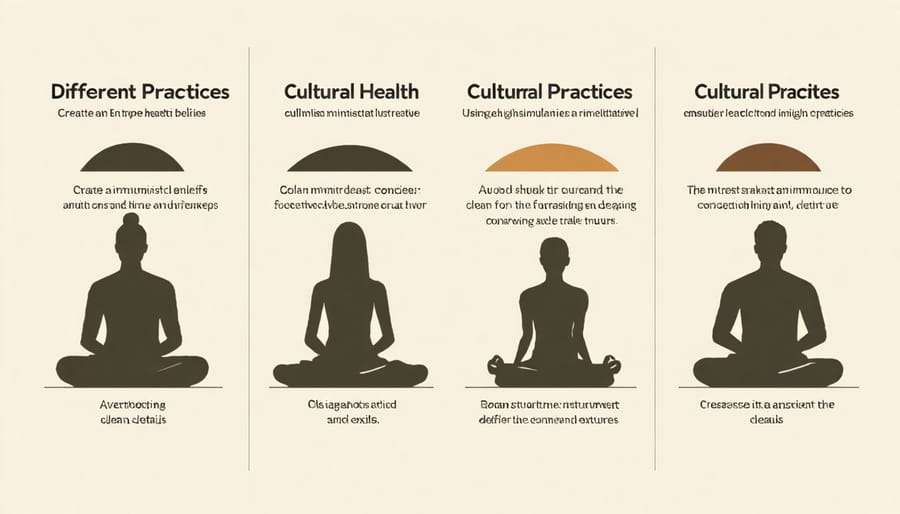Cultural competence in healthcare goes far beyond simply translating medical documents or offering interpreters. It’s about creating a healthcare system that understands, respects, and effectively responds to the diverse beliefs, behaviors, and needs of all patients. In Alberta’s increasingly multicultural communities, healthcare providers must deliver care that acknowledges each patient’s unique cultural background, from their traditional healing practices to their family dynamics and communication preferences.
When healthcare professionals practice cultural competence, they bridge the gap between medical science and human experience, leading to better health outcomes, increased patient satisfaction, and reduced healthcare disparities. This approach transforms routine medical care into personalized healing experiences that honor both scientific evidence and cultural wisdom.
For patients and healthcare providers alike, developing cultural competence means committing to ongoing learning, self-reflection, and genuine curiosity about different worldviews. It’s an essential skill that shapes every aspect of the healthcare journey, from prevention and diagnosis to treatment and recovery.

What Makes Healthcare Culturally Competent?
Understanding Cultural Beliefs and Values
Cultural beliefs and values significantly shape how people view health, illness, and medical treatment. For example, some cultural groups may prefer traditional healing practices alongside modern medicine, while others might have specific dietary restrictions that affect their treatment options.
In Alberta’s diverse healthcare landscape, we see various perspectives on things like end-of-life care, mental health treatment, and preventive medicine. Some communities might view illness as a spiritual matter rather than just a physical one, while others may have strong family-based decision-making practices that need to be respected.
These cultural differences can influence whether someone seeks medical care, how they communicate with healthcare providers, and how well they follow treatment plans. For instance, some cultures may be hesitant to discuss certain health topics openly or might prefer same-gender healthcare providers.
Understanding these differences isn’t about stereotyping – it’s about recognizing that each person’s cultural background provides important context for their healthcare needs. When healthcare providers take time to learn about and respect these cultural perspectives, they can provide more effective, personalized care that aligns with their patients’ values and beliefs.
Language and Communication Skills
Clear communication is the cornerstone of quality healthcare, and it becomes even more crucial when caring for patients from diverse cultural backgrounds. Effective health communication goes beyond just speaking the same language – it involves understanding cultural nuances, nonverbal cues, and different ways of expressing health concerns.
In Alberta’s multicultural healthcare environment, language barriers can significantly impact patient care. Healthcare providers must ensure patients fully understand their diagnosis, treatment options, and care instructions. This might involve working with certified medical interpreters, using translated materials, or employing visual aids to bridge communication gaps.
Cultural differences in communication styles also matter. While some cultures value direct communication, others may consider it disrespectful. For example, some patients might nod in agreement out of politeness rather than understanding. Healthcare providers need to verify comprehension by asking patients to explain information in their own words and encouraging questions.
Being mindful of these communication differences helps build trust, improves patient compliance with treatment plans, and leads to better health outcomes for all Albertans.

Why Cultural Competence Matters for Alberta’s Health
Meeting Our Community’s Needs
Alberta’s diverse population includes people from various cultural backgrounds, including Indigenous peoples, newcomers, and established ethnic communities. Our healthcare system must adapt to serve this multicultural landscape effectively. Cultural competence helps healthcare providers bridge communication gaps, understand different health beliefs, and deliver care that respects cultural practices and values.
In our province, cultural competence addresses specific needs like providing care in multiple languages, accommodating religious dietary requirements in hospitals, and understanding traditional healing practices. Many Alberta Health Services facilities now offer interpretation services, culturally appropriate meals, and spaces for traditional ceremonies.
Healthcare providers across Alberta are increasingly participating in cultural awareness training, with special emphasis on Indigenous health practices and newcomer health needs. This ongoing commitment to cultural competence ensures that everyone in our community receives respectful, effective care that aligns with their cultural values and beliefs.
Breaking Down Health Barriers
Cultural competence in healthcare helps break down significant health communication barriers that often prevent Albertans from different cultural backgrounds from receiving optimal care. When healthcare providers understand and respect cultural differences, patients are more likely to seek medical help early, follow treatment plans, and actively participate in their healthcare journey.
This understanding leads to better health outcomes through improved patient-provider trust, more accurate diagnoses, and treatment plans that align with cultural beliefs and practices. For example, healthcare providers who recognize traditional healing practices can work with patients to create treatment approaches that complement both modern medicine and cultural traditions.
In Alberta’s diverse communities, cultural competence has shown to increase preventive care visits, reduce emergency room use, and improve chronic disease management. Patients report feeling more comfortable discussing their health concerns when they feel their cultural background is understood and respected by their healthcare team.

Practical Steps for Better Healthcare Communication
Tips for Patients
As a patient, you play an important role in ensuring you receive culturally appropriate healthcare. Here are practical steps you can take to advocate for yourself and your family:
Be open about your cultural practices and beliefs during medical appointments. Share important information about dietary restrictions, religious observances, or traditional healing practices you follow. This helps your healthcare team provide more personalized care.
Bring a trusted family member or friend to appointments if you need support with language or communication. Alberta Health Services offers free interpretation services – don’t hesitate to request one when booking your appointment.
Ask questions if something doesn’t align with your cultural values or beliefs. Healthcare providers welcome respectful dialogue about your concerns and preferences.
Keep a small notebook of important cultural considerations to share with new healthcare providers. Include details about your preferred form of address, gender preferences for care providers, and any specific cultural protocols that matter to you.
Research and connect with cultural community health organizations in your area. They can provide valuable support and help you navigate the healthcare system while respecting your cultural identity.
If you experience culturally insensitive care, speak with the patient relations office at your healthcare facility. Your feedback helps improve services for everyone in our diverse community.
Remember, advocating for culturally appropriate care isn’t just about getting better treatment – it’s about ensuring your whole identity is respected in your healthcare journey.
Working With Your Healthcare Team
Building a strong partnership with your healthcare team is essential for receiving culturally appropriate care. Start by being open about your cultural background, beliefs, and preferences during medical appointments. This helps your healthcare providers better understand your needs and adjust their approach accordingly.
Don’t hesitate to ask questions if something isn’t clear. Healthcare providers in Alberta are committed to providing clear healthcare messaging, but sometimes cultural differences can lead to misunderstandings. If you’re uncomfortable with certain treatments or have specific cultural practices that affect your healthcare decisions, communicate these concerns respectfully.
Consider bringing a family member or trusted friend to appointments if you need support or help with communication. Many Alberta healthcare facilities also offer interpreter services – ask about these resources when booking your appointment.
Keep a record of your interactions with healthcare providers, including any cultural misunderstandings or positive experiences. This information can help improve future visits and ensure consistent care across different healthcare settings.
Remember that building cultural understanding is a two-way process. While healthcare providers should demonstrate cultural competence, your active participation in sharing your needs and preferences helps create better health outcomes. If you feel your cultural needs aren’t being met, don’t be afraid to advocate for yourself or seek support from patient advocacy services available in your community.
Resources for Culturally Competent Care
Alberta offers numerous resources to help healthcare providers and patients access culturally competent care. The Alberta Health Services (AHS) Cultural Competency Resource Hub provides online training modules, guidelines, and educational materials for healthcare professionals looking to enhance their cultural awareness skills.
In Edmonton and Calgary, the Multicultural Health Brokers Cooperative connects newcomers with trained cultural brokers who can assist with healthcare navigation and interpretation services. These brokers help bridge communication gaps between patients and healthcare providers while ensuring cultural practices and beliefs are respected.
The Provincial Health Services Indigenous Health Program offers specialized resources and support for Indigenous patients, including access to Traditional Wellness Workers and Indigenous Hospital Liaisons. These services are available at major hospitals throughout Alberta.
For healthcare providers, the Alberta International Medical Graduates Association provides cultural competency workshops and mentorship programs. These resources help internationally trained medical professionals adapt to Canadian healthcare practices while maintaining sensitivity to diverse patient needs.
Local community organizations like the Calgary Immigrant Women’s Association and Edmonton Immigrant Services Association offer healthcare navigation support and cultural competency resources in multiple languages. They can connect patients with healthcare providers who speak their preferred language or understand their cultural background.
The Alberta College of Family Physicians maintains a directory of family doctors who specialize in serving specific cultural communities. Patients can search for providers based on language skills, cultural background, and specific areas of cultural expertise.
To access these resources, contact Alberta Health Link by dialing 811 or visit your local Primary Care Network office for referrals and additional information.
Cultural competence in healthcare is a journey, not a destination. By understanding and embracing its principles, we can all contribute to creating a more inclusive and effective healthcare system in Alberta. Remember that being culturally aware and respectful isn’t just the responsibility of healthcare providers – as patients, we can also take steps to communicate our cultural needs and preferences clearly.
Take time to learn about the cultural competence resources available in your local healthcare facilities, and don’t hesitate to ask questions about culturally appropriate care options. If you’re managing a chronic condition or seeking preventive care, consider discussing your cultural background and beliefs with your healthcare team to ensure your treatment plan aligns with your values.
By working together – healthcare providers and patients alike – we can build stronger, more trusting relationships that lead to better health outcomes. Whether you’re accessing care in Edmonton, Calgary, or rural Alberta, cultural competence makes a real difference in the quality of healthcare you receive. Start the conversation about cultural competence at your next healthcare visit, and be an active participant in creating positive change in our healthcare system.

